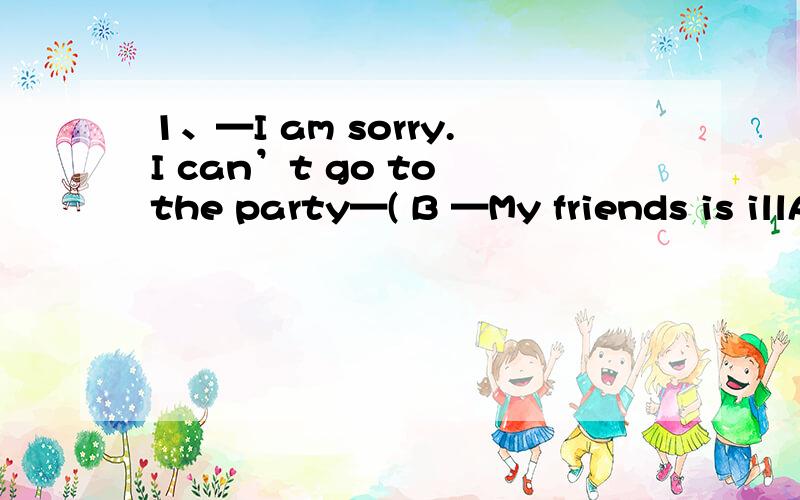1、—I am sorry.I can’t go to the party—( B —My friends is illA、What’s theproblem B、How come 2、So far,he musthave achieved is goal,C A、mustn’the B、hasn’t he C、didn’t he D、doesn’t he
来源:学生作业帮助网 编辑:作业帮 时间:2024/11/28 01:47:29

1、—I am sorry.I can’t go to the party—( B —My friends is illA、What’s theproblem B、How come 2、So far,he musthave achieved is goal,C A、mustn’the B、hasn’t he C、didn’t he D、doesn’t he
1、—I am sorry.I can’t go to the party
—( B
—My friends is ill
A、What’s theproblem B、How come
2、So far,he musthave achieved is goal,C
A、mustn’the B、hasn’t he C、didn’t he D、doesn’t he
1、—I am sorry.I can’t go to the party—( B —My friends is illA、What’s theproblem B、How come 2、So far,he musthave achieved is goal,C A、mustn’the B、hasn’t he C、didn’t he D、doesn’t he
第一题
1、come 常与 how 连用构成疑问句表示“怎么会这样”或“怎么回事”,come 相当于一个副词的用法.如:
How come he got the job? 怎么他会得到这个职位呢?(= He got the job, how come?)
How come you never visit me any more? 你为什么总不来看我呢,怎么事呢?(= You never visit me any more, how come?)
You were an hour late this morning, how come? (=How come you were an hour late?) 今天早晨你迟到了一小时,怎麽回事?
本题中选用how come 等于是 How come you can’t go to the party 的省略,意思是“你怎么就不能来参加聚会呢”,符合下文提出的理由My friends is ill(我朋友病了),与对话的语境一致.
2、What’s the problem 意思是“出了什么问题”,如果在此处选择,等于是What’s the problem with you 的省略,但是下文说的是My friends is ill,和 you 无关,与语境不一致.
第二题
“must have done” 是对过去事实的推测,he must have achieved is goal 的意思是“你过去一定达到了目的”,因此需要用表示过去的反意疑问句 didn’t he 与上文的过去呼应.
都是B,第一句是口语,第二句我以前学过,但忘了解释